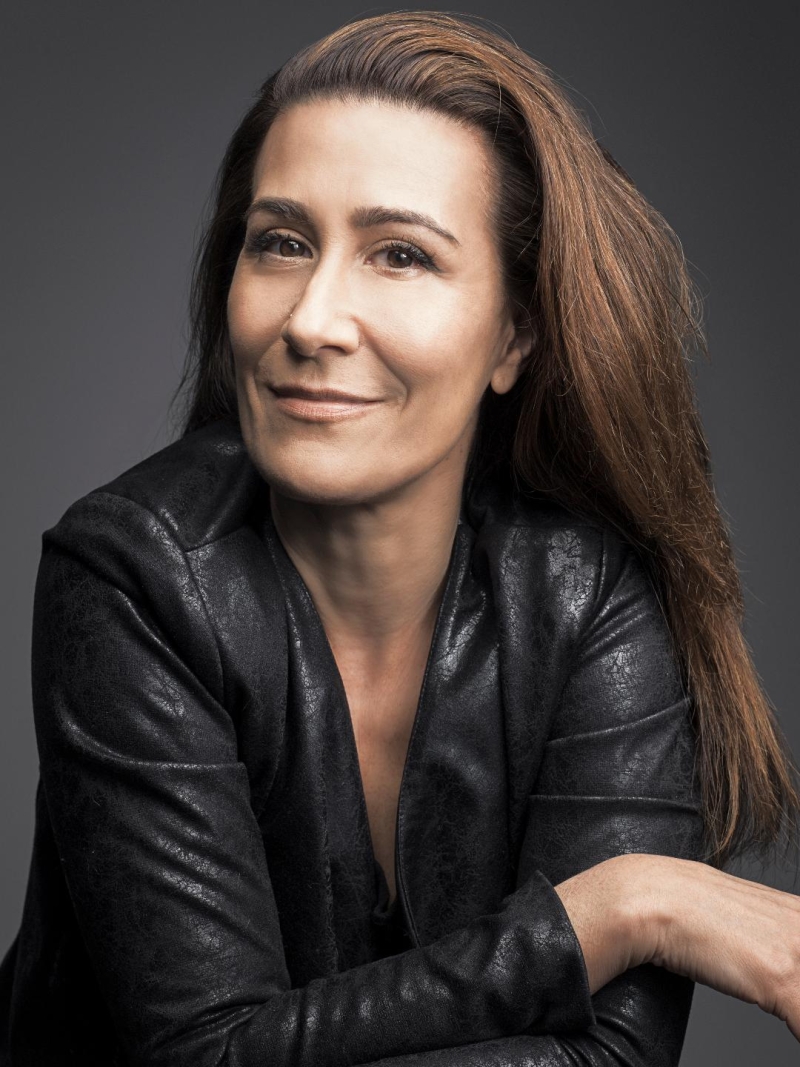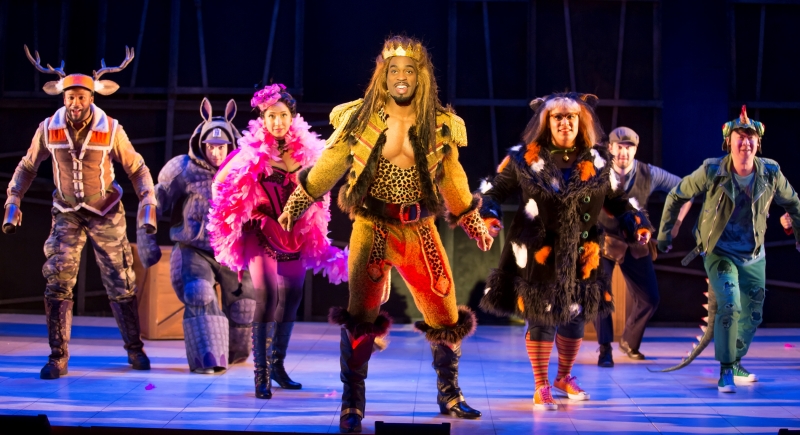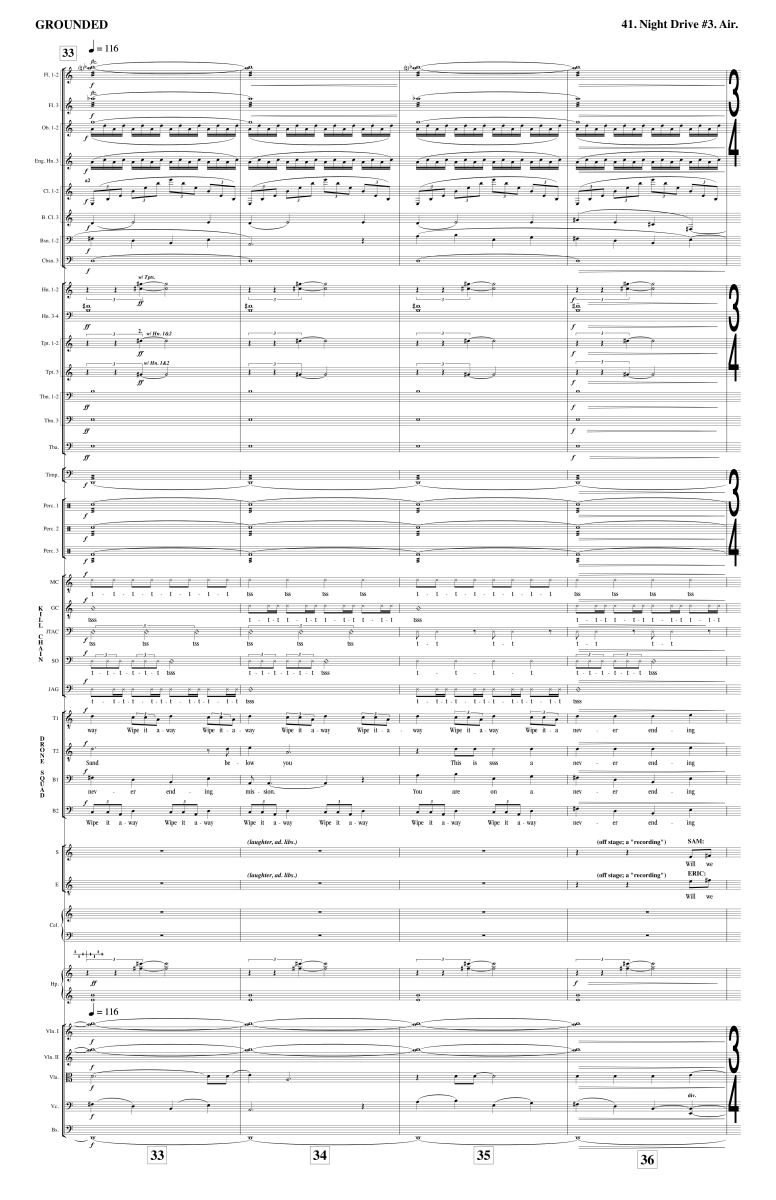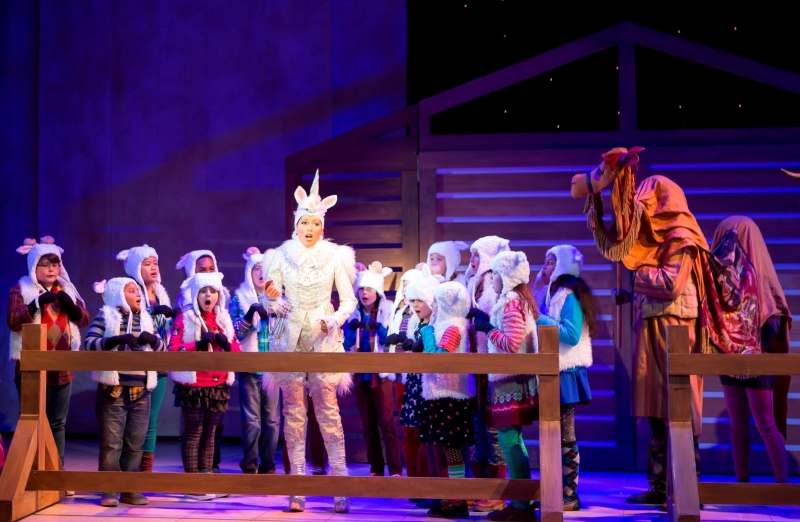Interview: Theatre Life with Jeanine Tesori
The two-time Tony Award winning composer on her family opera The Lion, The Unicorn and Me and more.

Today’s subject Jeanine Tesori is a two-time Tony Award winning composer whose work spans the gamut from large scale and chamber musicals for Broadway to grand opera and beyond. Her holiday children’s opera The Lion, the Unicorn and Me premiered ten years ago at Kennedy Center as a commission for Washington National Opera (WNO). The work will be returning to Kennedy Center’s Terrace Theater for a one weekend four performance engagement on December 8th through 10th.
Ms. Tesori’s works on Broadway are wonderfully varied. A few examples are as follows. Her score for Thoroughly Modern Millie takes us back to the roaring 20’s. With Violet, her score is more rural sounding as she perfectly captures the sound of the south in the early 60’s. Caroline or Change is a modern Broadway operetta and masterpiece. Then let’s not forget her two Tony Award winning chamber musicals. The ground breaking Fun Home which featured an all-female writing team and Kimberly Akimbo which proves that quirky non-traditional material definitely has a place on Broadway.
Her scores have been touched and graced by some of the greatest theatre orchestrators to be sure. Ralph Burns, Danny Troob, Larry Hochman, Joseph Joubert, and John Clancy are just a few of them.
Ms. Tesori’s musical greatness is not limited to Broadway by any means. Her off-Broadway credits include Soft Power at The Public Theatre and Mother Courage and Her Children and Twelfth Night for Shakespeare in The Park.
She has also written four operas. Three of them have been performed by WNO. Her newest one Grounded will go on to have another production at the Met in 2024.
As if all that isn't enough, she was the Supervising Vocal Producer for Steven Speilberg's 2021 film version of West Side Story.
When not creating musical masterpieces, she can be found teaching at Yale University where she is cultivating up and coming music majors. Can you imagine having her as your professor? You’d be very lucky!
In the past few years, Jeanine Tesori’s works have been seen a lot in DC. Blue, Grounded and The Lion, the Unicorn and Me will all have been seen at WNO and Fun Home recently completed a record breaking multi extension run at Studio Theatre. That should tell you something about Jeanine Tesori’s work. It always connects to its audiences and leaves them wondering what is next.
Please grab some tickets to The Lion, the Unicorn and Me. It’s a family opera but if you don’t have kids, don’t worry, the production is for everybody.
Jeanine Tesori is a prime example of an artist living her theatre life to the fullest. She is a composer with an impressive and varied canon of work. I think we can all agree her music is something we can all listen to for “Days and Days”.
Was writing operas something that was always part of the plan for you?
Yes and no, I never really had a plan after I graduated. I guess I would call it plan free. I had not expected to go into music at all. Music was something that was such a deep part of my life from a very, very young age. It was that inexplicable thing that draws you to something, that's what it's always been about for me.
It never occurred to me from a really young age that it was anything else but something that you love, and you do. I really bristled at the classical education I was getting. It wasn't fitting me, so I left music and studied science for a while and actually went to Barnard College to study science, biology, and physics, and then switched over after my first year because of a professor at Columbia University who was an amazing music professor. Because I was in New York City, I rediscovered that deep love. It wasn't because I was going into it, it was because I rediscovered my innate love for it. Then at that point I did my music major at Columbia. I graduated and I just started working as a musician anywhere I could. The adage of work gets work was completely true for me.
I loved studying. I just kept working and working and working, and trying also to make up for the lost time.
I loved opera, but I didn't imagine writing it. And then Francesca Zambello, years ago, asked me if I would be interested in writing a commission for Glimmerglass Opera. I’ve written four operas. One with Tony Kushner called A Blizzard on Marblehead Neck, The Lion the Unicorn and Me, Blue, and Grounded which will be my last in this form.
I was writing it with the idea of getting to a grand opera piece and so that led me here.
What is the biggest difference between writing a Broadway musical and an opera?
First of all, I would say one of the great differences is that you have an omniscient character called the orchestra. On Broadway we don't have that because the Broadway music portion has become more and more of a chamber portion. Six pieces, seven pieces, twelve or thirteen pieces. And when you get twenty-four instruments, but players it is very unusual, especially now. The minimum has become the maximum, so it's mostly eighteen or nineteen but, the last shows that I've done are all chamber shows, except for Soft Power Shrek, and Thoroughly Modern Millie all had twenty four. I really love a Broadway orchestra, but the sections of a Broadway orchestra are almost not available to anybody anymore.
In writing Grounded, I was able to continue, and I think that's a major, major difference, is you're able to continue the compositional impulse as you write for the orchestra. So I wrote the story, which we're doing major revisions on right now, and rewrites, because that's what you do.
Then you get to the orchestration, and you think, oh, it's this, this should be this, it's not that, it's this and then you keep going. The string section alone, just the violins alone become separate characters in the giant conversation for me of Grand Opera so that's a major, major difference.
It’s what you have at your command. I also feel like the palette for me is different. The way that people listen to opera is quite different than the way they listen to a Broadway musical. When you walk right through a portal to a Broadway musical, your expectation begins before you even sit down. If I go into a downtown 50 seat house, the threshold that I'm anticipating of watching something is very different than when I go into the Met, or when I go into a Broadway theatre or even the Atlantic Theatre. That's part of the experience, and that is a major difference.

The Lion, the Unicorn and Me.
Photo by Scott Suchman.
How did The Lion, the Unicorn, and Me come about? Was it your idea initially to create an opera of the material?
No, it was Francesca Zambello again. She had sent me Jeanette's book, which I really loved. I'm a huge fan of her writing. I love how she sees the world and how she describes the world, and the point of view of the nativity from the donkey, it was so inspiring to me.
We wanted to write something that was not only a holiday opera, but a real introduction to young people to the way that what a human can sound like when they use every single part. I'm amazed by opera singers with what they can do.
.jpg)
© Domenico Music Notes (ASCAP). Used by permission.
Can you please talk about the overall musical style of The Lion, the Unicorn, and Me?
It's not something I find easy to verbalize. I'm much better at writing notes down on a page. It is for younger ears, so I wanted it to be melodic. I wanted it to be accessible for them so that they could enter into the world.
I think it has at points a playful style, especially in the percussion, and especially for the lion, to be reminiscent of something they may have heard.

© Domenico Music Notes (ASCAP). Used by permission.
You recently premiered Grounded here in DC with WNO. Your previous operas Blue and The Lion, the Unicorn and Me had someone helping you with the orchestrations. With Grounded, you composed and orchestrated the whole opera yourself. What would you say was the most eye-opening thing for you about doing all things music with Grounded?
I'm still writing it. Everything I do I think about theatrically. We received one production of Grounded which I'm super proud of, and we learned a ton.
I'm still in the process of writing and it won't be finished until April first. This was the first pass. You put it in front of a paying audience and then you get information. They tell you things. You're like, oh my god, that doesn't work. I have to cut that whole thing. That doesn't work. I have to rearrange. Oh, now I understand. I didn't know that before. Now I know. And in opera, you get one shot. I think of the audience as the final scene partner. They give you all the information you need. It’s like raising a kid. A piece begins to tell you what it needs.
I notice that some of your works have a fair amount of percussion based sections. Is any of that influenced from working with orchestrator John Clancy, who's a percussionist himself?
Oh, absolutely. My score for Twelfth Night shows that very much. That was written before I met John. I've always had a real love of percussion, which I studied in my twenties, especially drums and the djembe. There are all different ways that cultures keep a beat. And it's just unbelievably fascinating, and you just listen, or read Alan Lomax, and you go across cultures, and you realize how much we share, though we don't acknowledge it, we do.
On Twelfth Night I used temple bowls and water gongs, and every instrumentalist played five to fifteen instruments. It was very percussion based. With Mother Courage, I was really looking at Theater of War with that kind of fife and drum thing. It looks at how the Theater of War is a presentation. If you think about bagpipes not being heard, a hundred bagpipes playing is a terrifying sound when you can't see them.
John was in the pit of Caroline or Change. My mentor and I invited him into our group of musicians. We all studied together and helped each other out with all of the work. He has a great love of the orchestra.
I saw you conduct The Secret Garden on Broadway as Michael Kosarin’s assistant under the name Jeanine Levenson. You also did the dance arrangements. If someone gave you an opportunity at this point in your career to conduct on Broadway again, would you accept it?
No, because I'm not that good. I have a deep love, and deep enthusiasm, but I know my gifts and conducting is not one of them. I've conducted for years and years, especially in the recording studio. I have conducted hundreds of hours, and I've learned from it, but no I wouldn't do it, because I don't have enough skill.

The Lion, the Unicorn and Me.
Photo by Scott Suchman.
Some parents think opera is not for kids. For those who think The Lion, the Unicorn, and I isn’t for their kids, what would you say to convince them that it definitely is.
Bring them to the opera, Live music has energy that you cannot get from a recording. That's just physics. You receive something that is undeniable. You bear witness to something around the campfire that you do not get through a screen. You also understand why human beings are physically capable of producing such beauty from every part of their being. I think it's such a gift to bring someone to. Plus, it's short.
Fun Home and Kimberly Akimbo were both orchestrated brilliantly for small ensembles by John Clancy. If there was a production of either of those shows that said “We want to expand the orchestrations” would you let that happen or is the more intimate sound exactly what you wanted and you feel it doesn’t need to be changed?
That's a good question because it just depends on what and where it is. We thought about this a lot when we did the West Side Story film. I was really pushing Stephen Spielberg and Matt Sullivan, the music executive producer. Can we do a concerto rosso kind of thing to get that grit?
What's really tricky about filling a chamber work is that you’re always asking would it be better with a giant group behind it? It's like, right, you could do it, but why would you? I think that way about Kimberly Akimbo. Who doesn't love a giant string section? It's really defined by the gem that it is. It's a small story with an epic feel.
Ultimately, it would just depend on the context, where it is, whether it should happen, and whether the work would be better for it.
What does 2024 hold in store for you?
The biggest thing would be the revisions that I'm doing on Grounded before it opens the Met’s 24/25 season. There is also a new tour of Shrek going out plus I’ll be teaching again at Yale for the next semester.
Special thanks to Kennedy Center's Senior Press Represenitive- Classical David Hsieh and Chris Anselmo at Siena Music for thier assistance in coordinating this interview.
Theatre Life logo designed by Kevin Laughon.
Comments
Videos


.gif)